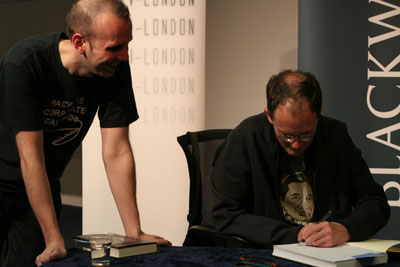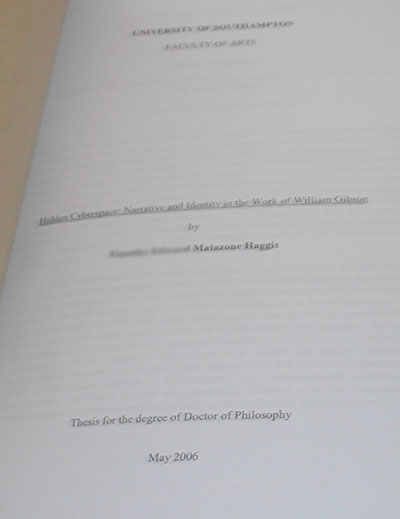It’s been a bit quiet on my site for a while now, so you may wonder what I’ve been doing with my time. This week has been a good example, and I feel I’ve been really productive.
This week I got my complete thesis over to my tutors, I’ve been learning some new PHP, I’ve got through a few lessons in Japanese, I’ve got a dull-but-harmless temp job, I feel like I’ve progressed a lot in my Wing Chun class, and I’ve even had some freelance work helping Wateraid promote the upcoming World Water Day.
In more detail:
I’ve put through most of the changes suggested by my copy-editor friend in my thesis and got that sent off to my tutors on Monday. Next up with my Ph.D. is the response from the tutors, which will hopefully be ‘this is ready’ or might ask for a few changes. Either way we’ll probably go ahead with contacting the examination committee. You need two internal examiners and one from outside the university. Once they’ve agreed to examine my thesis and they’re ready then my thesis gets sent to them and I wait for three months-or-so while they read it. I then have an interview with them where they get to ask me questions about my ideas and generally discuss what I’ve written. This usually lasts about an hour, but apparently has been known to spill over into dinner and late-night drinking! I’m guessing that any interview that ends with a slurred proclamation of eternal friendship will generally count as a ‘pass’.
The most likely result of this will be a request for minor changes to be made. This is usually stuff to do with formatting and an occasional paragraph here and there. This is a common request these days because it’s so much easier to ask for changes in the computer age than it was when everything was hand-written and typed. Typically I will have six months to make these changes, but usually they can be done a lot faster and the thesis resubmitted. Assuming the thesis has been changed to the satisfaction of the committee I then pass and do a little dance. And then dance a bit more. I plan to graduate in October at the latest.
The PHP stuff is for a new website I’m working on (hence the haitus in animations recently). PHP is like html except that it allows webpages to talk to a database and create ‘dynamic’ content, which is just a fancy way of saying that it responds to what you do. I’m at the point now where I believe I can put together the basic structures of the site so I’m hoping to get that going in the next couple of weeks.
I’m learning to speak Japanese from audio-lessons on my MP3 player. It’s interesting, but the style of presentation could be done in a more structured way to help learning. Mostly it’s repeating stuff parrot-fashion, so you have to work out the grammar of what’s going on for yourself. Still, it’s a good start.
I’m not selling enough stuff in my shop to afford to live even on a very low wage, so I’ve started temping part-time to pay the bills. This is another reason for the lack of animating recently. Real jobs suck, but the one I’m doing at the moment is nice enough and quite easy. At least it gives me time to doodle!
Wing Chun is a type of kung fu, and the only major martial art system in the world that was invented by a woman. It relies on angles and sensitivity rather than strength so can help small people beat much stronger opponents. I studied it when I was first at university and I started again last year when a new class opened in my area. A lot of the form is based on the idea of flowing around and through your opponents defences, creating a system that becomes incredibly effective even when applying only the basic techniques.
Lastly, Wateraid are a great charity that I’ve worked with a few times before and I’m really happy to be helping them produce presentation for their build up to World Water Day on the 22nd March.
I feel like I’ve been really productive this week and I’m feeling generally very happy with life. As usual, and as you can probably tell, I’m ridiculously busy, but I’m getting results which makes me feel good. I’m sure you can see why my work on this site has been slower than usual!



